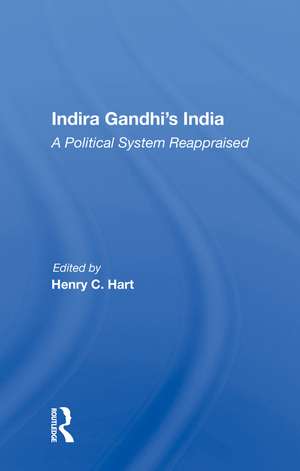Indira Gandhi's India: A Political System Reappraised
Editat de Henry C. Harten Limba Engleză Hardback – 7 iun 2019
Preț: 764.20 lei
Preț vechi: 1027.40 lei
-26% Nou
Puncte Express: 1146
Preț estimativ în valută:
146.25€ • 152.49$ • 121.54£
146.25€ • 152.49$ • 121.54£
Carte tipărită la comandă
Livrare economică 20 martie-03 aprilie
Preluare comenzi: 021 569.72.76
Specificații
ISBN-13: 9780367020637
ISBN-10: 0367020637
Pagini: 328
Dimensiuni: 152 x 229 mm
Greutate: 0.45 kg
Ediția:1
Editura: Taylor & Francis
Colecția Routledge
Locul publicării:Oxford, United Kingdom
ISBN-10: 0367020637
Pagini: 328
Dimensiuni: 152 x 229 mm
Greutate: 0.45 kg
Ediția:1
Editura: Taylor & Francis
Colecția Routledge
Locul publicării:Oxford, United Kingdom
Descriere
India, credited with the best institutionalized democracy of the Third World, changed in 1975, apparently overnight and at the decision of one individual, to a quasi-dictatorship. A transformation so remarkable prompted eight scholars of Indian politics to reexamine the sectors of the system they know well, seeking explanations. They reappraise the carry-over of colonial institutions and procedures, the distribution of power in the ruling party, business influence, the roles of the divided Communist parties, the position of the administrative corps and of the army, and unrest among the rural poor at its most volatile, in the state of Bihar. An introduction shows just what Mrs. Gandhi changed, the situation that triggered her action, and the justification she advances. A concluding chapter tests the facts of the Indian transformation against four major theories of political change in the developing world: projection into politics of personality conflicts of the leader, agrarian class conflict, social mobilization, and cultural assimilation and institutionalization.
